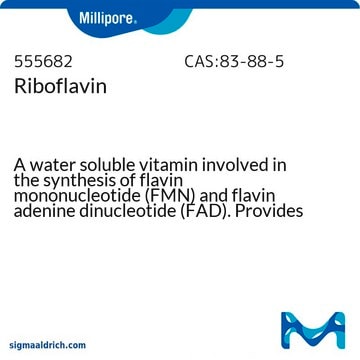V-015
(−)-Riboflavin (Vitamin B2) solution
100 μg/mL (Methanol:0.1% Ammonium acetate in Water (1:1)), ampule of 1 mL, analytical standard, Cerilliant®
Synonym(s):
(−)-Riboflavin, Vitamin B2, Lactoflavin, Vitamin G
About This Item
Recommended Products
grade
analytical standard
certified reference material
Quality Level
form
liquid
feature
Snap-N-Spike®/Snap-N-Shoot®
packaging
ampule of 1 mL
manufacturer/tradename
Cerilliant®
concentration
100 μg/mL (Methanol:0.1% Ammonium acetate in Water (1:1))
mp
290 °C (dec.) (lit.)
application(s)
clinical testing
format
single component solution
storage temp.
2-8°C
SMILES string
CC1=C(C)C=C(N(C[C@H](O)[C@@H]([C@H](O)CO)O)C(C2=N3)=NC(NC2=O)=O)C3=C1
InChI
1S/C17H20N4O6/c1-7-3-9-10(4-8(7)2)21(5-11(23)14(25)12(24)6-22)15-13(18-9)16(26)20-17(27)19-15/h3-4,11-12,14,22-25H,5-6H2,1-2H3,(H,20,26,27)/t11-,12+,14-/m0/s1
InChI key
AUNGANRZJHBGPY-SCRDCRAPSA-N
Looking for similar products? Visit Product Comparison Guide
Legal Information
related product
Signal Word
Danger
Hazard Statements
Precautionary Statements
Hazard Classifications
Acute Tox. 3 Dermal - Acute Tox. 3 Inhalation - Acute Tox. 3 Oral - Flam. Liq. 2 - STOT SE 1
Target Organs
Eyes
Storage Class Code
3 - Flammable liquids
WGK
WGK 2
Flash Point(F)
49.5 °F - closed cup
Flash Point(C)
9.7 °C - closed cup
Certificates of Analysis (COA)
Search for Certificates of Analysis (COA) by entering the products Lot/Batch Number. Lot and Batch Numbers can be found on a product’s label following the words ‘Lot’ or ‘Batch’.
Already Own This Product?
Find documentation for the products that you have recently purchased in the Document Library.
Customers Also Viewed
Our team of scientists has experience in all areas of research including Life Science, Material Science, Chemical Synthesis, Chromatography, Analytical and many others.
Contact Technical Service







